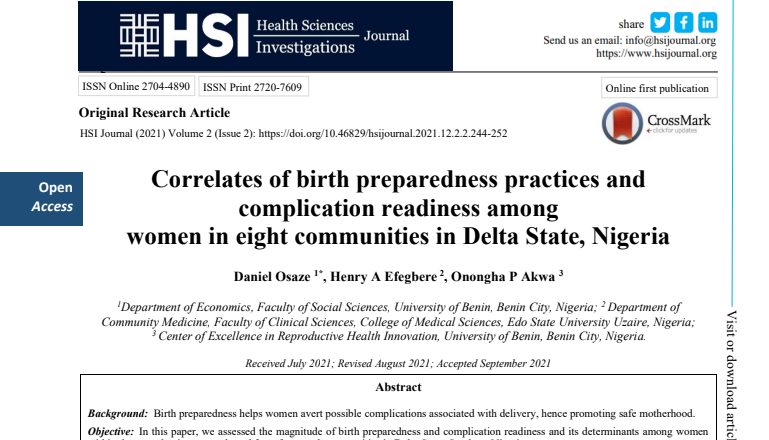Correlates of Birth Preparedness Practices and Complication Readiness among Women in Eight Communities in Delta State, Nigeria.
Abstract
Objective: Birth preparedness helps a woman avert possible complications associated with delivery, hence promotes safe motherhood. In this paper, we assessed the magnitude of birth preparedness and complication readiness and its determinants among pregnant women selected from four rural communities in Delta State, Southern Nigeria.
Methods: The Cochrane (1977) formula was used to estimate a sample size of 400 women within the reproductive ages. Analyses were undertaken at two levels that are at univariate and multivariate. At univariate, simple percentages and frequencies were used to describe the feature of respondents. At the multivariate, logistic regression was used to determine the predictors of birth preparedness and complication readiness among the women. The results were presented as Odds Ratio at 95% while CI. P < 0.05 was used to dictate statistical significance.
Results: The results revealed that 48.7% of the respondents were prepared for birth and 42.9% were prepared for complication. About 36.7% saved money for delivery expenses, 28.1% knew the signs for the onset of labour, 35.2% bought all the materials they need and put them on the ground, 24.7% reported they knew the exact date for their delivery and 26.6% saved fund for emergency complications. In addition, 52.1% of respondents had overall knowledge of obstetric complications. The logistic regression revealed that employment status, number of living children and set of communities were the significant predictors of birth preparedness plan and complication readiness among the study participants.
Conclusion: The study concluded that the level of birth preparedness and complication readiness is low among sampled group. In addition, knowledge of danger signs is unimpressive. The study, therefore, recommended that intervention programs that educate rural women on danger signs of complications and also on the benefits of birth preparedness should be implemented in rural part of Nigeria.


